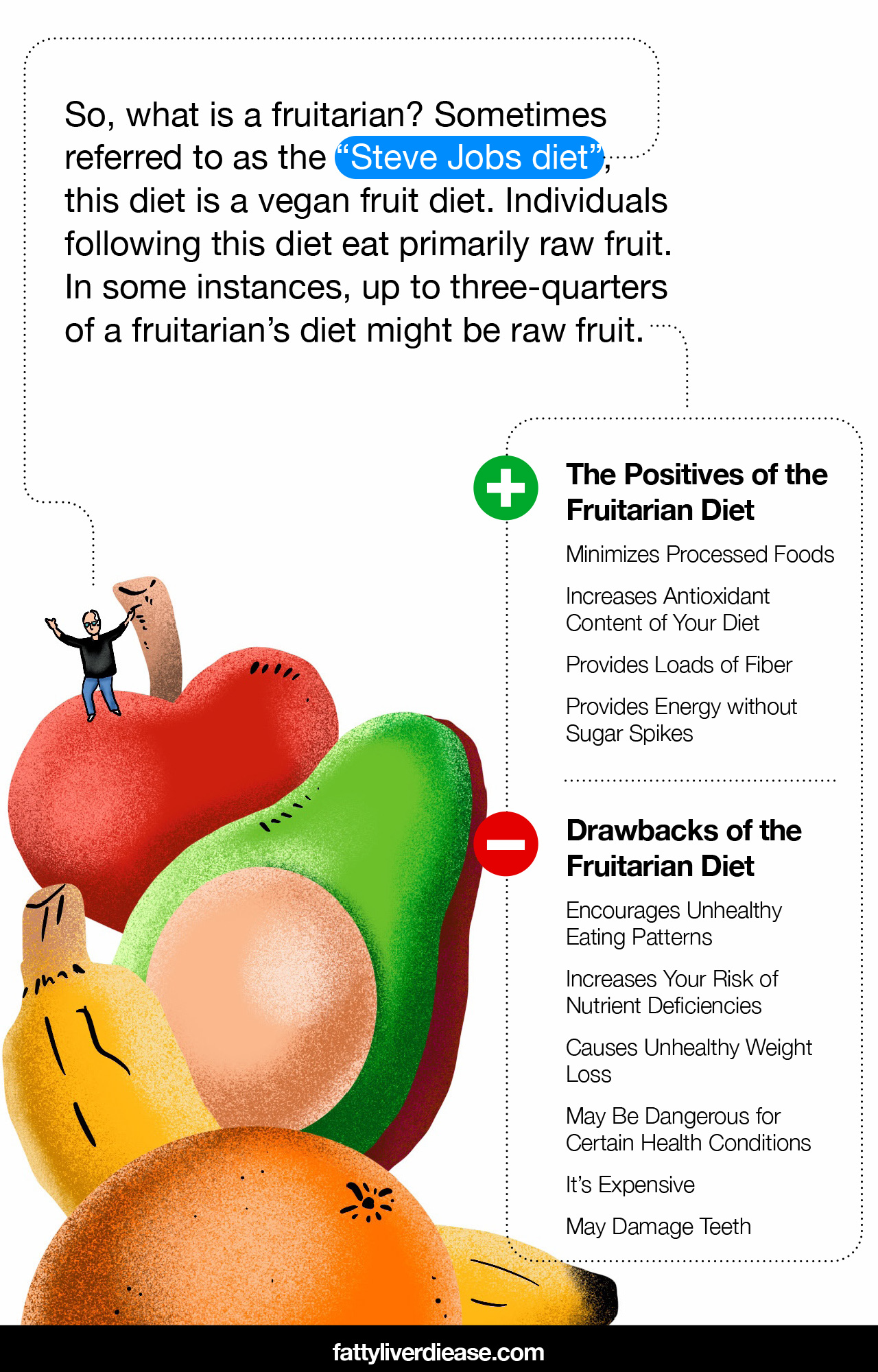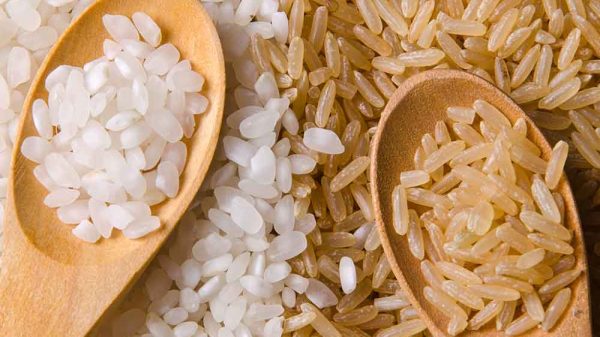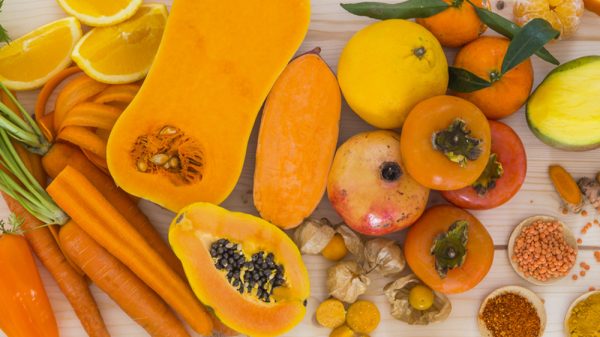You might have heard of fruitarianism because of famous fruitarians like Steve Jobs, Mahatma Gandhi, and Leonardo da Vinci. You might be familiar with fruitarianism from Ashton Kutcher, who gave the fruitarian diet a try for about a month. Or, you may simply have heard of fruitarianism from google searches. If you are considering following the fruitarian diet, there are some important aspects of this extreme diet that you should consider, before going all in. Read on to find out more!
What Is the Fruitarian Diet?
So, what is a fruitarian? As the name suggests, the fruitarian diet is basically a vegan fruit diet. Individuals following this diet eat primarily raw fruit. In some instances, up to three-quarters of a fruitarian’s diet might be raw fruit.
Was Steve Jobs a fruitarian? Steve Jobs did indeed follow a fruitarian diet through certain periods of his life. He was also known to restrict the variety of foods in his diet, as well as engage in fasting. However, it’s important to realize that only an adapted fruitarian diet can provide the nutrients needed for optimal health.
Sometimes referred to as the “Steve Jobs diet,” the fruit diet may be considered by some to be an extreme blend of veganism and the raw food diet. The premise of the fruit diet is that it is possible to sustain oneself without needing to kill any living organisms, including plants.
The Positives of the Fruitarian Diet
Though the fruitarian diet lacks balance and is not the best idea, there are some positives that are important to consider.
Minimizes Processed Foods
By following a fruitarian diet, you by default cut down on your consumption of processed foods. The fruitarian diet emphasizes the importance of consuming whole foods, such as fruits, nuts, and seeds. Processed foods usually contain bits of plant material, dairy, and animal products that do not fall within fruitarian guidelines.
Cutting out processed foods greatly decreases your intake of added sugars, refined carbs, and saturated fat. In turn, this decreases your risk of developing metabolic conditions such as insulin resistance and fatty liver disease.
Increases Antioxidant Content of Your Diet
Fruits, nuts, and seeds automatically increase the antioxidant content of your diet. Fruits, nuts, and seeds are packed with antioxidants like polyphenols and carotenoids that help fight against oxidative stress. Oxidative stress refers to the buildup of waste products within cells, which affects the efficiency and accuracy of cellular processes. Increased levels of oxidative stress are implicated in many different disease states, from fatty liver disease to cardiovascular disease. The antioxidants present in fruits, nuts, and seeds scavenge free radicals that cause oxidative stress, helping to neutralize them so that cells can repair.
Provides Loads of Fiber
In addition to being filled with antioxidants, fruits, nuts, and seeds are loaded with fiber. Eating an abundance of fiber helps support the digestive tract by encouraging the growth of healthy bacteria, which helps reduce systemic inflammation. Eating tons of fiber also helps prevent episodes of gastrointestinal disorders like irritable bowel syndrome, inflammatory bowel syndrome, ulcerative colitis, and diverticulitis.
Provides Energy without Sugar Spikes
Contrary to popular belief, the natural sugar in fruit is not equivalent to the sugar found in candy and soda. When we eat candy and soda, the added sugars are broken down in the digestive system and glucose molecules are immediately released into the bloodstream. In turn, this spikes blood sugar and over time causes insulin resistance, fatty liver disease, and weight gain. Though added sugars may provide energy, the sugar rush is temporary and leads to a crash.
In contrast, the sugar present in the fruit is also bundled with fiber, vitamins, minerals, and antioxidants, which greatly impacts how the body handles the sugar particles. Because of the high amount of fiber, the body is unable to access the sugar right away. Instead, the fruit is digested much more slowly and provides a stable amount of sugar as energy, without the crash.
Drawbacks of the Fruitarian Diet
The fruitarian diet comes with several negative points. Let’s go through those now.
Encourages Unhealthy Eating Patterns
The fruitarian diet definitely encourages restrictive eating patterns. Eating raw fruit as three-fourths of your entire diet is simply extreme and unhealthy. Individuals who are prone to extreme behaviors or eating disorders are particularly prone to the negative side effects of the fruitarian diet.
Increases Your Risk of Nutrient Deficiencies
Strictly following the fruitarian diet dramatically increases your risk of developing nutritional deficiencies of the following nutrients:
- Vitamin D: Vitamin D is absolutely essential for the immune system, bone health, and reducing inflammation. Vitamin D is not naturally present in any fruit. For the general population, dietary vitamin D is obtained from fortified foods like cheese and milk. Fruitarians must be careful to take supplemental vitamin D or get enough sun exposure to keep vitamin D levels within a normal range.
- Calcium: Calcium is a critical nutrient for fortifying bone strength and facilitating the absorption of vitamin D. Calcium is usually found in dairy products like milk and cheese, as well as leafy greens. Fruitarians can also incorporate a calcium supplement into their diets.
- Protein: Fruitarians are at great risk for protein deficiency. Protein is vital in the human diet to provide essential amino acids, which are the building blocks of protein. Essential amino acids must be obtained in optimal ratios on a daily basis since the human body is unable to manufacture them endogenously. Amino acids are crucial for building muscle tissue, neurotransmitters, hormones, and enzymes. Balanced ratios of essential amino acids are only available in animal protein sources, such as meat, dairy, fish, and eggs. Beans, nuts, seeds, whole grains, and tofu are good sources of plant proteins, although they don’t offer balanced ratios of essential amino acids. Although fruitarians can eat beans, nuts, seeds, and tofu, to make sure that you’re getting optimal ratios of essential amino acids, these foods must be combined on a daily basis. Because fruitarians are restricted to eating beans, nuts, seeds, and tofu as only 25% of their diet, they are at a greater risk of getting inadequate levels of essential amino acids.
- Iron: Iron is very important to red blood cells, and helps them carry oxygen throughout the body. Simply eating raw fruits, nuts, and seeds, will not supply the iron that your body needs for adequate oxygenation.
- Vitamin B12: Vitamin B12 is vital for the health of the nervous system and for preventing anemia. Vitamin B12 is extremely hard to come by in any diet that cuts out animal products. Low levels of vitamin B12 have repercussions for both brain and blood health. Supplementation is the best way to ensure adequate levels of vitamin B12 for those following a vegan or fruitarian diet.
Causes Unhealthy Weight Loss
If you are overweight, weight loss is a good thing. However, weight loss should be achieved in a healthy way. The deficiency of protein that accompanies the fruitarian diet means that muscle loss is very likely. Losing muscle causes an unhealthy body composition because both muscle and fat are lost. Ideally, weight loss entails primarily fat loss and as little muscle loss as possible. Having enough muscle mass is crucial for maintaining strength and keeping metabolic rates high.
May Be Dangerous for Certain Health Conditions
For individuals with insulin resistance and type 2 diabetes, eating reasonable portions of fruits as part of a balanced diet is very healthy. However, eating massive amounts of high-glycemic fruit may destabilize blood sugar levels. If you’re considering following a fruitarian diet and you have underlying conditions, it’s best to first consult your physician and nutritionist.
It’s Expensive
Eating only fruits on a fruitarian diet can get really expensive, really quickly. The fruitarian diet encourages you to eat a variety of fruits, including tropical fruits like mango and pineapple. Purchasing enough fresh fruit to meet the majority of your calorie needs can be much more expensive than following a balanced diet that includes foods from all food groups.
May Damage Teeth
Eating an excess of fruit may cause wear and tear on your tooth enamel, resulting in tooth decay. This is because many fruits have acidic properties. When the teeth are repeatedly and consistently exposed to acid, this can erode the teeth. For example, the fruits with particularly acidic properties include citrus fruits like oranges, limes, lemon, and grapefruit, as well as pineapple. It’s also possible that the sugar present in very sweet fruits may increase your risk of developing cavities.

How to Balance the Fruitarian Diet
There’s no question that a fruitarian diet is an extreme form of raw veganism. The best way to exercise fruitarianism is to take the positive aspects of the diet and incorporate balance
Add in Veggies
Even though vegetables aren’t traditionally part of the fruitarian diet, it’s a good idea to add them in. Vegetables contain a variety of nutrients that fruits don’t, including iron and calcium. For a more well-rounded diet, add in leafy greens such as kale, spinach, collard greens, and swiss chard.
Reduce the Amount of Raw Fruit
Instead of having raw fruit comprise 75% of your diet, have it comprise something more like 45% or 50%. Eating less raw fruit helps to balance out the other food groups, so you can eat a variety of foods, so you don’t put yourself at risk for nutritional deficiencies. Eating a smaller quantity of raw fruit also decreases the risk that your teeth will decay as a result of excessive acid exposure.
Get Omega-3 Fatty Acids
Omega-3 fatty acids are seriously lacking in the fruitarian diet. Omega-3 fatty acids are polyunsaturated fats that protect brain health and reduce inflammation throughout the body. You can get the plant form of omega-3 fatty acids from flaxseeds, chia seeds, and walnuts, which contain alpha-linolenic acid. The trick here, however, is that the body must convert alpha-linolenic acid into a usable form. However, the animal form of omega-3 fatty acids tends to be more potent, since it is immediately available for use by the body. To get the animal form of omega-3 fatty acids in your diet as a fruitarian, supplementation is probably the best idea.
Eat a Variety of Nuts
Nuts contain protein as well as important vitamins and minerals that help the body function normally. Cashews, walnuts, pecans, and almonds are excellent choices of nuts.
Take Advantage of Avocados
Avocados are considered to be a fruit and they offer tons of healthy fat and vitamin E. Incorporate avocados into your meals regularly, to ensure you’re getting the nutrients that you need.
Eat a Variety of Fresh Fruit
If you have decided to follow a somewhat fruitarian diet and decide that 45% of your diet will be raw fruit, it’s important that you eat a wide variety of fruit. For example, if you just ate raw apples as for 45% of your diet, you would miss out on the other fruits that offer a diverse array of vitamins and antioxidants. Make sure you eat a variety of fruits like blueberries, blackberries, cranberries, and raspberries. Tropical fruits like papaya and pineapple are also very nutritious because they contain enzymes that help break down proteins.
Stay Away from Fruit Juices and Dried Fruit
If you’re following a partial fruitarian diet, it’s a good idea to stay away from fruit juices and dried fruit. This is because fruit juice and dried fruits are processed forms of raw fruit. Juices such as orange juice and apple juice tend to contain concentrated sugar without the fiber. As a result, drinking juice tends to spike your blood sugar, much like candy and cookies that contain added sugars. Fruit juice is artificially processed by humans to remove the fibrous part of the plant, therefore getting rid of the fiber content that usually accompanies the sugar. For dried fruit, it’s the same thing. Removing all liquid from fruits leaves the remaining skin as well as lots of sugar.
The one exception is coconut water, which is naturally present within coconuts and is not artificially processed to remove certain parts of the coconut.
Precautions
A restrictive fruitarian diet is not the best diet for your health, and may actually cause more health issues than it resolves. Vegetarianism or balanced veganism is a better route to go. A well-planned, less restrictive form of the fruitarian diet may be good for your health while limiting nutritional deficiencies. Always check with your physician and a registered dietitian before committing to a diet plan.
The Fruitarian Diet: The Bottom Line
Eating a strict fruitarian diet is not healthy. Healthy eating is characterized by consuming a variety of foods that offer a balance of nutrients. The fruitarian diet deprives the body of foods that offer critical nutrients, such as protein, calcium, and vitamin D. In order to make the fruitarian diet work, it’s important to limit the amount of raw fruit that you eat, and balance the raw fruits with other food groups such as nuts, seeds, leafy greens, and vegetables.























